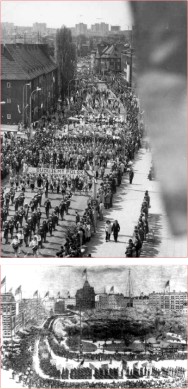Feature
1st May-the signature left by workers
Subir Das
 IF I talk about a world where an architect submits a design of a tower and bricks after bricks stand over one another automatically, gets stuck at their particular positions in an excellent precision, perhaps you will call me an inebriated or insane guy. IF I talk about a world where an architect submits a design of a tower and bricks after bricks stand over one another automatically, gets stuck at their particular positions in an excellent precision, perhaps you will call me an inebriated or insane guy.
Even a kid will burst into laughter at such unbridled fiction about a world where an automobile engineer prepares the design of a car and all the parts are made and adjusted automatically in a wonderful accuracy. In fact, there are innumerable iron hands which turn the designs into structures and which make every sphere of our lives easier and comfortable. They have bequeathed their lives to action rather than contemplation or reverie. At least a day in year, we pay tribute to these workers who turned the wheel of civilization into rolling. At least this day, we recall the revolution launched by the labourers who vigorously defied working longer than one-third of a day, which triggered a massive demonstration resulting in deaths of several protesters.
Looking in retrospection, we see in the world history that workers in the USA were repressed; they couldn't make a good proportion between their calorie and salary; they could never be a part of the upper class society. The protest carried out by the workers of Chicago on 1st May 1880 was a breakthrough in establishing their rights which left one of the paramount signatures in history. The slogan 'eight hours labour, eight hours recreation and eight hours rest' spurred out of the protesters' vocals shook the position of the repressive authority. The entire working system turned into drudgery, as there were arduous working condition, low remuneration and owners' contempt. The animosity over the owners who enjoyed the economic flourishing after the industrial revolution and kept the fate of labourers in the same darkness erupted during the workers' revolution. In today's context, it may seem as a nightmare that the labourers would be scourged as a penalty of trivial mistake or remiss. But the contemptible practice was quite normal even one and a half centuries ago when the western world got the golden luster of civilization.
Whatever the height we touch is our temptation to hurting people living in the lower position than us is always irresistible. It is historical and statistical. The background of the 1st May also reiterates the statement. The atrocities on the people of Bangladesh committed by the heinous Pakistani soldiers reiterate the statement. The incidence of repressing the tribal people in Bangladesh also corroborates the statement. The dream of a utopia or the expectation of the songster, “it's a new world, it's a new day” may only be a dream. But the signature left by the workers on 1st May cannot be erased by the ravages of time; cannot be eclipsed by the journey of civilization.
| 